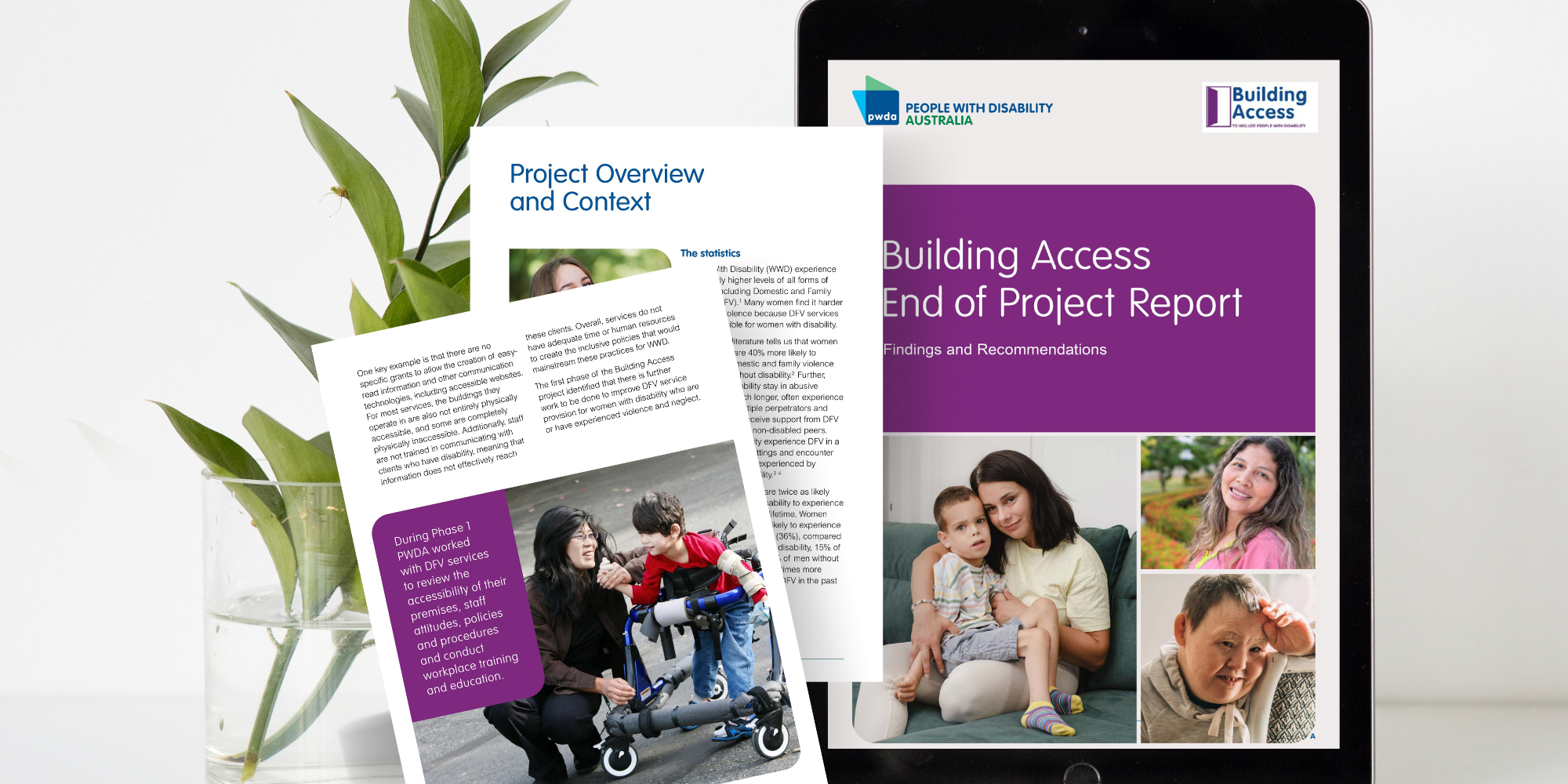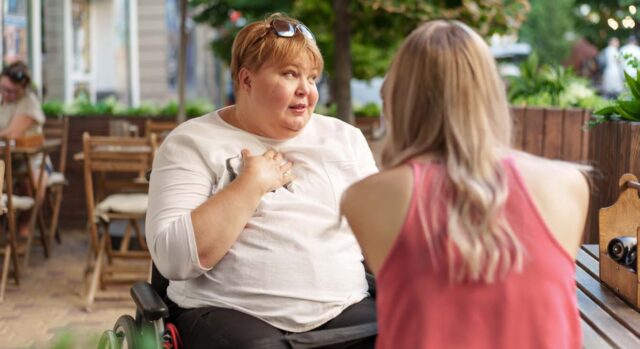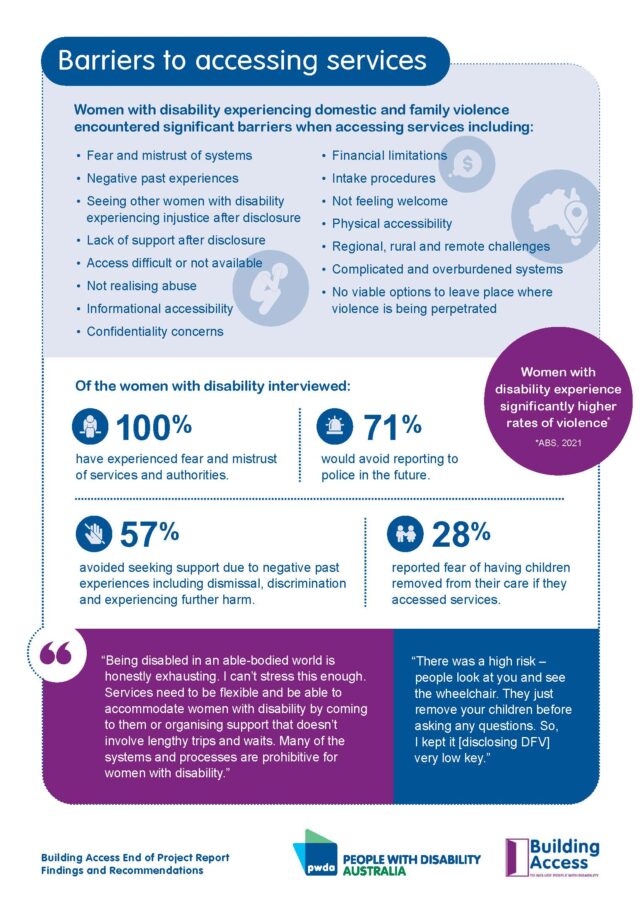
Building Access project

Managed by PWDA, the Building Access project is an innovative initiative enabling domestic and family violence (DFV) services to better meet the needs of women and children with disability. The project is not only unique in addressing and increasing the accessibility of DFV services across NSW but is also of national significance
Building Access seeks not only to improve the accessibility of frontline DFV services but also to advance the fundamental human rights of women with disability (WWD).The two phases of the project have now concluded and PWDA has released the Building Access End Of Project Report.
The report clearly indicates that inclusive policies and practices produce better outcomes for women with disability, both as staff and clients of domestic and family violence services.
PWDA is calling for additional funding for the Building Access project to ensure its national rollout in response to the report.
Resources
A Handbook on Supporting People with Intellectual Disability who have Experienced Domestic and Family Violence
The handbook and video were created in collaboration with the Queensland–based WWILD Sexual Violence Prevention Association. The handbook is targeted at the NSW sexual, domestic and family violence sector and aims to develop skills and knowledge on how to support people with intellectual or learning disability who have experienced domestic and family violence.
Additional resources
These resources were produced by PWDA and DVNSW:
- 30 Ways to Make Your Service More Accessible – PDF and Word
- Creating an Inclusion Action Plan – PDF and Word
- Women with Disability and Domestic and Family Violence: A guide for policy and practice – PDF and Word
You can also watch our videos on YouTube.
Easy Read resources
- Easy Read: About abuse
- Easy Read: About sexual abuse
- Easy Read: How to report abuse or sexual violence to the police
- Easy Read: Consent Form
This project is funded by Women NSW.
About domestic and family violence for women and children with disability
Women with disability are approximately 40 per cent more likely to experience Domestic and Family Violence (or DFV), an alarming statistic when considered in the context of Australia’s DFV epidemic.
Many women find it harder to escape violence because DFV services are inaccessible for women with disability. PWDA’s Building Access project aims to increase the accessibility of DFV services for women with disability in New South Wales.
PWDA is working with Domestic Violence NSW and Women’s Community Shelters to improve responses for women with disability experiencing violence.
DFV services include but are not limited to: Women’s health centres, counselling services, accommodation and homelessness services, family support services, legal services, women’s resource centres, and organisations tackling these issues on a sector-wide systemic level.
Women with disability may experience barriers to accessing services, including:
- Physical barriers that mean they can’t access services
- Information about the services may be inaccessible
- The staff who work at the services may not feel confident supporting women with disability
- Policies or practices in these services might exclude women with disability.
We can do the following to support DFV services in becoming more accessible:
- Perform an access review of the service to assess barriers for women with disability to the service
- Provide a detailed report on physical, information and attitudinal barriers and advice on implementing greater procedural access
- Provide guidance on how to develop a Disability Inclusion Action Plan (DIAP) for DFV services
- Connect the service to a Community of Practice
- Provide Disability Awareness and NDIS training
The Building Access project’s Expert Advisory Group is made up of disability advocates, women with disability, violence organisations, government representatives and other people who are interested in the project.

Enquiries
You can also email the project officer at training@pwd.org.au or call 1800 422 015 to register or ask any questions about this project.
Ends | Contact us
Videos and accessible media
Easy Read resources
Key findings

Get involved
Become a member: Sign up now. It’s free!
Make a donation: Giving feels great!
Get our latest news: Straight to your inbox!

![PWDA-Services-5 - People with Disability Australia [IMAGE white line icon of three people]](/wp-content/uploads/2022/04/PWDA-Services-5-1320x743.png)
![PWDA-Services-8 - People with Disability Australia [IMAGE white line icon of a heart shape with a dollar sign in the centre]](/wp-content/uploads/2022/04/PWDA-Services-8-1320x743.png)
![PWDA-Services-6 - People with Disability Australia [IMAGE white line icon of newsletter with the word News in block letters]](/wp-content/uploads/2022/04/PWDA-Services-6-1320x743.png)